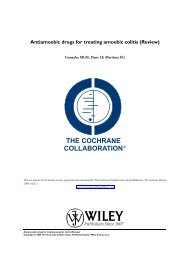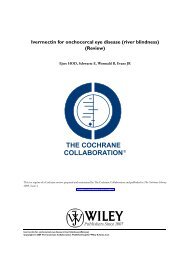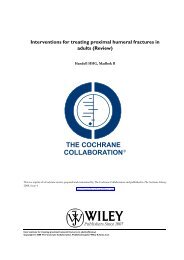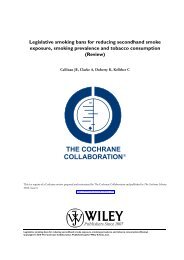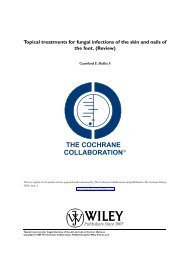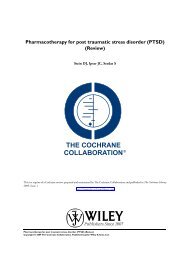Artemisinin-based combination therapy for ... - The Cochrane Library
Artemisinin-based combination therapy for ... - The Cochrane Library
Artemisinin-based combination therapy for ... - The Cochrane Library
Create successful ePaper yourself
Turn your PDF publications into a flip-book with our unique Google optimized e-Paper software.
Koram 2003 GHA (Continued)<br />
Adequate sequence generation? Yes ’Computer generated random list <strong>based</strong> on<br />
a simple random selection procedure’<br />
Allocation concealment? No None described<br />
Blinding?<br />
All outcomes<br />
Incomplete outcome data addressed?<br />
All outcomes<br />
No An open-label trial. No comment on blinding<br />
of laboratory staff<br />
No ’Patients who showed signs/symptoms of<br />
severe malaria, had serious adverse events<br />
or required blood transfusion were withdrawn<br />
from the study’. <strong>The</strong>se events after<br />
enrolment would represent treatment failure<br />
and should not be withdrawn.<br />
Free of selective reporting? Yes <strong>The</strong> WHO recommends 42 days follow up<br />
in studies of AL6. Day 28 outcomes may<br />
under estimate treatment failure with AL6.<br />
Free of other bias? No Participants in the AL6 group were significantly<br />
older and had a higher Hb at baseline.<br />
This is due to differing inclusion criteria<br />
<strong>for</strong> the 2 groups and is likely to affect<br />
the result.<br />
Lefevre 1999 THA<br />
Methods Trial design: An open-label clinical and pharmacokinetic randomized controlled trial<br />
Follow up: Monitored 3 times daily until parasites and fever cleared. <strong>The</strong>n follow up at<br />
days 1, 2, 3, 7, 14, 21, and 28 <strong>for</strong> temp and malaria film.<br />
P. vivax during follow up was treated with CQ and primaquine and continued in follow<br />
up<br />
Adverse event monitoring: Assessed at each visit. ECG monitoring and laboratory tests<br />
(including FBC liver and renal function tests) at baseline and each day of follow up.<br />
Participants Number: 219 randomized<br />
Inclusion criteria: Age > 12 yrs, weight > 35 kg, microscopically confirmed P. falciparum,<br />
in<strong>for</strong>med consent<br />
Exclusion criteria: Signs or symptoms of severe malaria, heart disease or significant ECG<br />
abnormalities, psychiatric disorders, severe renal or hepatic impairment, history of drug<br />
hypersensitivity or allergy<br />
Interventions 1. Artemether-lumefantrine, fixed dose <strong>combination</strong>, 20 mg/120 mg tablets (Coartem:<br />
Novartis)<br />
• 4 tablets twice daily <strong>for</strong> 3 days<br />
2. Artesunate plus mefloquine, loose <strong>combination</strong> (Artesunate: Guilan, Lariam: Hoffman-La<br />
Roche)<br />
• AS 4 mg/kg once daily <strong>for</strong> 3 days<br />
<strong>Artemisinin</strong>-<strong>based</strong> <strong>combination</strong> <strong>therapy</strong> <strong>for</strong> treating uncomplicated malaria (Review)<br />
Copyright © 2009 <strong>The</strong> <strong>Cochrane</strong> Collaboration. Published by John Wiley & Sons, Ltd.<br />
73



